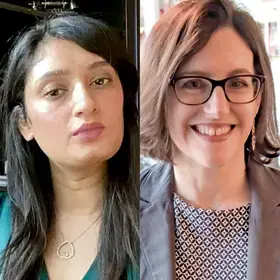Kim Waeber, 2012 graduate of the Information and Knowledge Strategy program (formerly called the Information and Digital Resource Management program) at Columbia, has started a company with her sister with the mission of giving women in Tanzania access to life-changing mobile phone technology.
Through their education and work experiences, the Waeber sisters learned that women worldwide are 21% less likely to own a mobile phone than men. In Tanzania specifically, only 36% of women own mobile phones.
Their initial research revealed that phones in Tanzania were used for a broad range of vital purposes related to health and economic development: to send free mosquito net vouchers to prevent malaria; to provide pregnant women without healthcare to receive health advice and reminders via text message; to give farmers access to market pricing information and allow them to reap a greater profit on their crops; and, particularly for women, to give them information to help them run their businesses.
After a year of further research and planning, the sisters founded “Kidogo Kidogo” in November, 2013. The company, whose name in Swahili translates to “little by little,” sells iPhone cases in the U.S. designed by Tanzanian-based artist, Sarah Markes. The cases, which feature illustrations of some of Tanzania’s most iconic wildlife, are priced at $30 each —with a buy-one-give-one twist.
“Mobile phones in Tanzania are prepaid and owners can buy credits at bodegas and other small stores,” explains Waeber. “However, the number one reason preventing women from phone ownership is the initial cost of $15 for a mobile handset. So when you buy a case, we buy a phone or phone credits to give to a woman who could not otherwise afford it. Think of it as Tom’s Shoes or Warby Parker, but with cell phones.”
Tanzanian women receive the phones through established local nonprofit partners. One is FINCA, a global charitable microfinance organization, whose mission is to provide financial services to the world’s lowest-income entrepreneurs so they can create jobs, build assets, and improve their standard of living. A portion of the proceeds from the sales of the case with the sea turtle design will be distributed to Sea Sense, an environmental NGO in Tanzania that works closely with coastal communities to conserve and protect endangered marine species.
Kidogo Kidogo also enlisted a women’s cooperative in Zanzibar to design and create pouches made of kitenge, a distinctive, colorful East African cotton fabric, which come with every case purchased.
Waeber says she’s seen a positive response so far from her enterprise.
“The women who have received these phones have been thrilled,” she says. “These are women who own businesses and have families. They are hard workers who know the difference a phone can make in their lives. My sister, Kristen, was able to meet with the women and hear their stories and learn how these phones were going to impact their lives.”
One of these women, Asha, who has three children, started a small business selling staples such as salt, sugar, and vegetables. Through mobile financial services, she uses her phone to repay the small business loan she received to get her business running. The ability to make payments with the push of a button, instead of having to travel to meet loan officers, lets her spend more time growing her business.
The knowledge and skills Waeber gained at Columbia continue to help her meet the range of demands put on a small business-owner.
“I was exposed to data analytics, which I use daily to evaluate who is visiting our website and where they’re coming from,” she says. “This helps me determine where to target advertising and publication submissions. I learned about the importance of digital asset management when managing an inventory. I remember thinking I’d never need to know that when I was sitting in class, but I really appreciate it now. The marketing and finance classes I took are also invaluable. The nice thing about the program is the real-life examples which translate into owning a business.”
The next step for Kidogo Kidogo is to continue expanding both the number of countries in which they distribute, as well as the number of case styles and designs they offer.
“The support we’ve seen has been really inspiring,” Waeber says. “People really have been responding well to Kidogo Kidogo and it has been really reassuring to see all the emails coming in from people who have heard of us and have suggestions or want to let us know of other organizations we can connect with.”
Katrina (Kate) Pugh, Academic Director for the IKNS program, points to the venture as a “tremendous example of knowledge-product and a knowledge-based business.” She adds, “Kim’s Kidogo Kidogo solution – the well-informed positioning in women’s mobile phones, the buy-one-give-one model, the community of artists and forward-thinking customers – is a great example of ‘taking knowledge to market.’ And, Kim has gone further to ‘take knowledge to economic development.’ As IKNS is doubling-down on the idea of knowledge-driven innovation, I hold up Kim as a great example for our current students to follow.”


